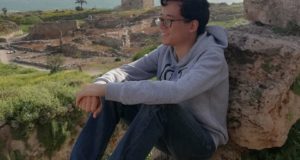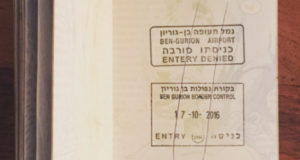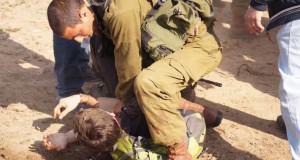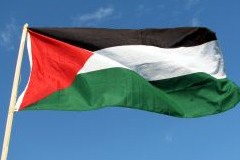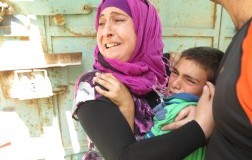An Austrian citizen of Jewish origin and grandson of Holocaust survivors was banned yesterday from entering Israel on suspicion of volunteering in Palestine. After being interrogated, searched, and held for 6 hours at Tel Aviv’s Ben Gurion Airport, Edmond Sichrovsky, 23, was forcibly deported to Amman, Jordan.
Read More »Deported
24th October 2016 | Sarah Robinson | occupied Palestine On Monday, 17 October 2016, I was deported from Israel. This is my story. I left Johannesburg on Sunday evening, 16 October, and flew to Istanbul, Turkey. The check-in process was ...
Read More »Crackdown on international human rights activists in Palestine: arrests, deportations, and abuse
31st January 2014 | International Solidarity Movement | Occupied Palestine With the arrest of two international human rights activists at Salem Military Court, in Jenin district, on Wednesday 29th January 2014, the total number of arrests of activists in the ...
Read More »Peaceful protest ends in deportation and imprisonment
20th January 2014 | International Solidarity Movement | Occupied Palestine On Saturday 18th January during a peaceful protest in the Jordan Valley, 19-year-old Ahmad Walid Atatreh, a Palestinian activist and 24-year-old Sven W, a German activist who lives in Switzerland, were arrested and beaten ...
Read More »Two international activists to be deported after their arrest is declared illegal
09th January 2014 | International Solidarity Movement | Occupied Palestine Yesterday, Wednesday 8th January, at approximately 11am in Khalil (Hebron), Vincent Mainville and Fabio Theodule (Swiss and Italian citizens respectively), were arrested by Israeli border police officers. The two international activists ...
Read More »“The Israeli system has a contempt for justice” – Swedish activist being deported despite false charges and legal appeal
13th May 2013 | International Solidarity Movement | Hebron, Occupied Palestine By Team Khalil UPDATE 14th May 2013: Gustav is currently being put onto a plane against his will. His lawyer tried a last minute stay on the deportation to ...
Read More »12- and 11-year old Palestinian children arrested after attack by settler children – Swedish activist also arrested, resisting deportation
28th April 2013 | International Solidarity Movement, Hebron, Occupied Palestine By Team Khalil UPDATE 2nd May 09.30 Full video of child arrests now available from Youth Against Settlements. Swedish activist Gustav is resisting deportation to highlight the issue of child ...
Read More »ISM activist risks jail, pledges not to answer questions if stopped under Terror laws in the UK
11th March | International Solidarity Movement, Occupied Palestine Tom Woodhead, an ISM activist who is currently being deported by Israeli immigration authorities, has pledged not to answer questions if British authorities attempt to misuse the Terrorism Act 2000 when he arrives ...
Read More »International activist faces deportation after Kufr Qaddoum demonstration
One international activist and two Palestinians were arrested at this Friday´s demonstration in Kufr Qaddoum. Around 150 Palestinians, together with Israeli and international activists, participated in Kufr Qaddoum’s weekly demonstration against the closure of the road leading to Nablus. After ...
Read More »Two ISM activists facing deportation after new protest village ‘Canaan’ update
Update on 10 February: All Palestinian activists arrested at protest village ‘Canaan ‘ released ISM activist on huger strike! Dave and Marco are being held in Givon prison and are expecting deportation. One of them, Marco Di Renzo (54), has ...
Read More » International Solidarity Movement Nonviolence. Justice. Freedom.
International Solidarity Movement Nonviolence. Justice. Freedom.
